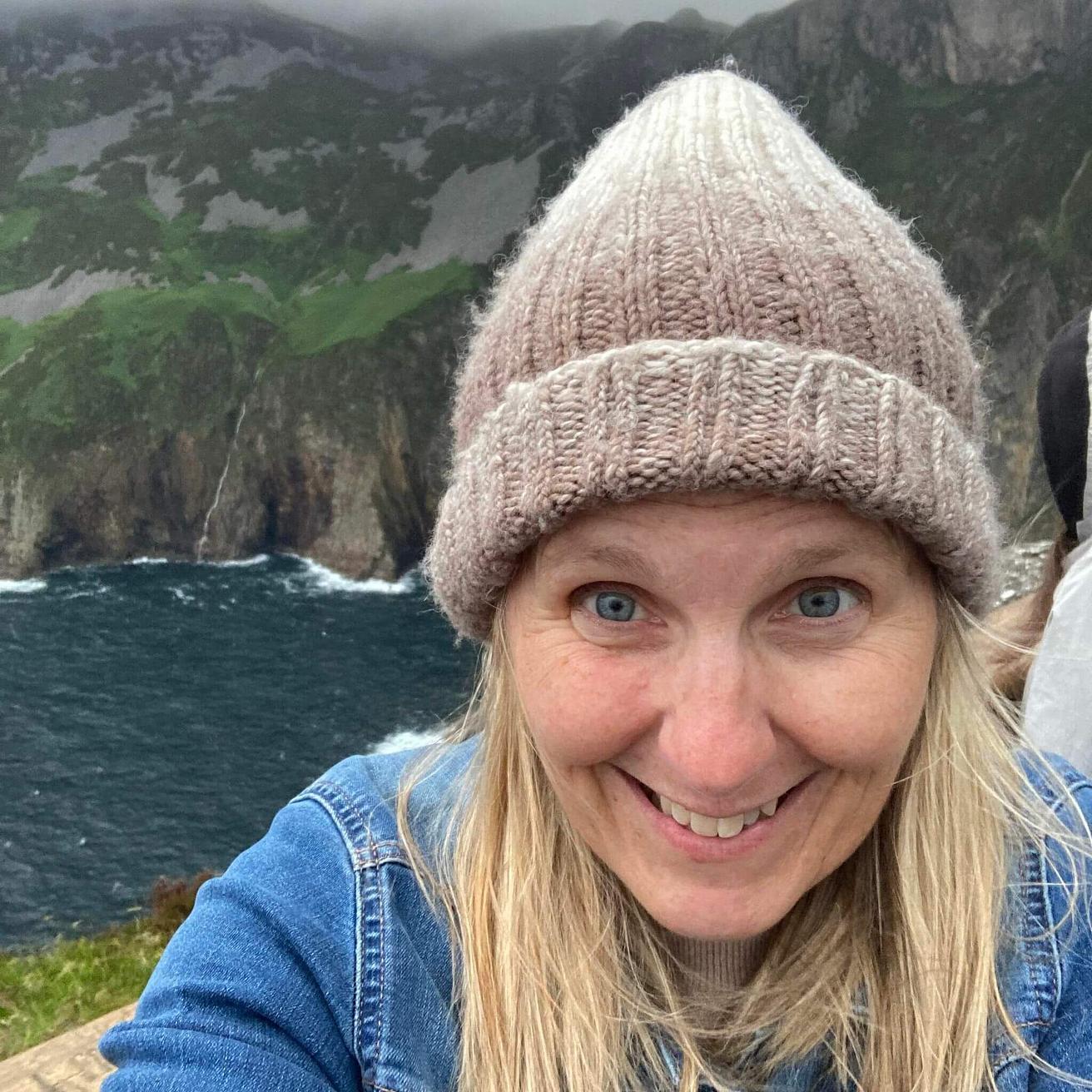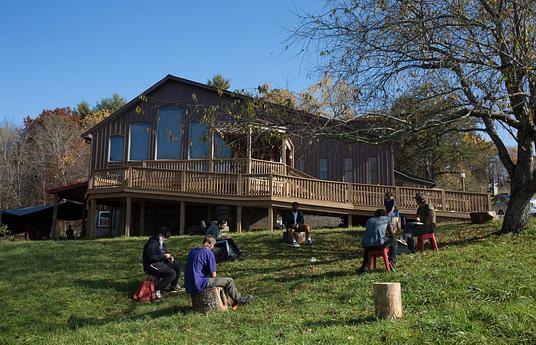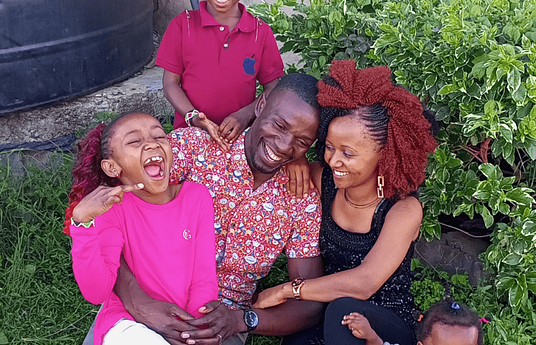Hello everyone! My name is Jenny Finn and I am a HundrED Country Lead for the United States. I live in the Blue Ridge mountains in Floyd, Virginia on a farm right in the heart of Appalachia. We are in the prime of summer here with delicious peaches, blueberries, and lots of veggies to enjoy. Floyd is a vibrant place with a strong culture of the Appalachian musical tradition, artistry, and local foods. It is the perfect place for Springhouse; a school I co-founded almost ten years ago here. Springhouse has a vision of regenerative culture and our mission is to create and share a model of regenerative culture through vitality-centered education.
I live on a farm and love to grow flowers, walk my dog, ride my Peloton bike, and hang out around the fire with my family and friends at our little house on the hill. Sitting out on my front patio at night, seeing a vista of the Blue Ridge mountains with fireflies sparkling in the pasture, is one of my most favorite things to do. If I am not at home, I am usually at Sprinhouse, with an amazing team of people working to manifest a mighty vision through whole-system educational design change.
What was the moment, realisation or a person that made you excited about education in the first place?
When I was a young adult, I was pretty lost actually. I went to a college preparatory high school in the Midwest and went straight to the same college where my friends and boyfriend went. I really had very little idea of who I was and what I wanted in my life. I was not asked very good questions as I grew up.
In my early twenties, I woke up to the gift of my life in a very extraordinary way, and shortly thereafter, faced a life threatening illness when I was 25.
These formative experiences led me into a vocation and calling and also to a graduate degree in social work, and then a Ph.D. in education. My dissertation focused on the importance of creating educational designs that invite the deepest part of ourselves forward in order to live a more authentic life of service in a world that needs more love and vitality. I am very passionate about living in a more vital culture and I know this starts with an individual in a community. Education is the greatest leverage point we have to shift culture in this direction.
Where do you see the biggest opportunities for innovators in your region?
I live in a creative place where experimentation and tradition often intersect. When it comes to education, in this small county of 15,000 people and one stoplight, there are four private independent schools, in addition to the public schools. There are businesses engaged in generative practices and a lot of experimentation in agriculture and food systems. There is an ethos of artistry with music and the arts at the center of culture here in the mountains. This area, and Floyd town in particular, is a really wonderful place to innovate. It is also an incredibly beautiful place with the low rolling mountains and green pastures. My hope is that educators in this area doing school and education differently work together with each other more, and with community organizations to better serve our area. As far as the United States, there are plenty of innovations doing great work within and outside of the dominant educational paradigm.
My hope nationally is that we have more experimentation with whole system design change in education.
What are the challenges that slow down innovation in your context?
An attachment to the familiar, even if it doesn’t work, is at the heart of what hinders innovation in this culture. A teacher of mine once said that we hold onto suffering because it is familiar. It is hard to move from preservation at all costs, the preservation of tradition even when it is not working, to a more experimental mode of being. Navigating change and the ambiguity that comes with experimentation needs to strengthen (among other things) if we are to make the changes we need to in education.
I think lack of self awareness, which stalls human development, is probably the greatest challenge we face.
And this, of course, is complex.
What little or big part do you want to play in improving education?
I see “school” as the greatest cultural leverage point we have to build a regenerative, vital culture. School is a cultural institution that we all have to go through in some form. It is the place where we could be learning and growing together in ways that bring us alive. Howard Thurman, American author and philosopher writes:
“Ask yourself what makes you come alive, and go do that, because what the world needs is people who have come alive.”
We need more societal structures that support our development in ways that take care of life within and around us. When we support human development in ways that foster the vitality of a person and community, we move toward a culture that cares for the gift of this life. I am playing a part in moving toward this vision by providing leadership for a place whose mission is to create and share a model of regenerative culture through vitality-centered education. I am also grateful to be learning from other innovators in education through networks like HundrED.
Who would you like to see joining the HundrED community to accelerate the pace of change?
I would love to see more people engaged in whole-system educational design experimentation. I have been hearing the word “permissionless” when it comes to education recently. I think it basically means you are an innovator who is truly free to create a new design for school and reconstruct from its roots what education actually means.
I am grateful for all of those working within the current dominant educational system and helping to relieve the symptoms of a design that lacks vitality at its core. I would love to meet more people who have had the freedom to create something emergent from themselves and their places.
We need more designs in practice that are engaging education in ways that are drastically different, not in opposition to our current system, but more as a response to what is actually needed today.
How does a future worth aspiring look to you?
I am living in the future worth aspiring to. The vision will always be for me a regenerative, life giving culture, where all people are connected to the life force within and around them. Our mission, everyday, is to create and share a model through vitality-centered education that builds this kind of culture now. This includes everything from our model for culture building, our vitality-centered educational design and curriculum, and our generative economic model.
When I recently shared the structure and process of our generative economic model at Springhouse, this person (who was the Head of School in a private school in the US) said, “You are living the economic model of the future; one rooted in community.” The dream for me is the reality we experiment with every day, as we create a shareable model for others interested in defining education as a way to create regenerative culture. In this model that I am engaged with, we support vitality-centered development of adolescents and adults through vitality-centered education. This kind of education privileges knowledge that supports a person in becoming a regenerative culture builder; includes fortification practices that fortify not only the individual but the community as a whole; opportunities to practice culture building that brings forth vitality; and reflective practices that include supporting a person in knowing where they are, how they can learn and grow, and then marking and celebrating with them along the way (rites of passage being one way we do this.) This looks like dancing and singing together, learning about things like human-nature reciprocity, psychology and human development, ecology, cultures and how they form, apprenticeships in the community, intergenerational learning, and more. When we do all of this in place over time in community, a regenerative culture is built one day at a time. This is the dream I work to manifest alongside a team of amazing people and a community of very dedicated people of all ages.
Hundred, and other networks like it, are a wonderful way to share what we are up to, and learn from others along the way. Thank you for the opportunity to be a part of it!
Connect with Jenny on LinkedIn
If you are interested in joining the HundrED community, you can find more information here.


